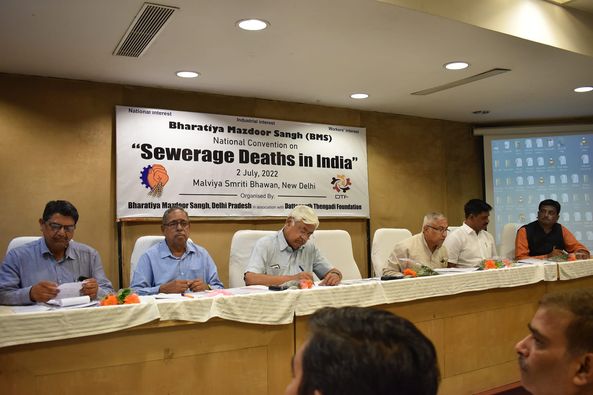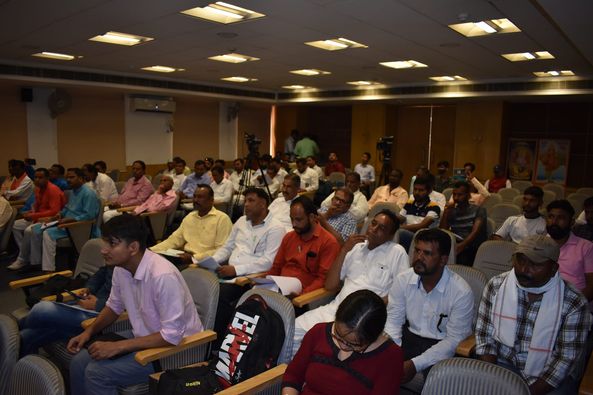Manual sewerage scavenging has been an old practice in India being done by specific castes in different states. This particular profession comes under the ambit of one of the dirtiest, dangerous, and demeaning jobs and it takes a toll on lives and dignified livelihoods. Bhartiya Mazdoor Sangh in association with Dattopant Thengadi Foundation in this regard has organized a one-day ‘National Convention on Sewerage Deaths in India’ on 2 July 2022. The convention was attended by some of the prominent leaders working in this field, especially sewerage workers. They generously bestowed their experiences on the plight of sewerage workers in India, the death caused by the same, and the role of different institutions and society to curb this fatal practice or at least mitigate the ill-effect associated with the occupation.
The program saw labour representatives coming from different parts of India, workers, and researchers. The program started with the lighting of the lamp.
In the introductory session of the programme, various issues relating to the dangerous work- profile of the sewerage workers leading to high number of sewerage deaths, their low status in the society, the importance of collective voice and the role of municipalities has been drawn by the workers representatives. Also, the role of safai karmchari in times of pandemic and its humanitarian ground has been established. It is further emphasized that humanity needs to be reflected in the wider society as well in order to understand the demeaning working conditions of the sewerage workers leading to consequent illness, short life span, and deaths as well.
While speaking on the issues of sewage workers, Shri Surendran ji in this regard delivered the purpose of the convention by introducing different types of safai karmcharis working in India namely, Sweepers, Waste management workers, and drainage workers. In order to deal with the issues relating to these workers such as wages, working conditions, and damage compensation (social security), there are contractors. There is an enormous amount of inequality that prevails in the wages of these workers. In his keynote address Shri Alok ji discussed the hazardous working conditions and the impediments caused by the contractors to provide needed assistance, minimum wages, and other benefits provided by the government. He also shared his experiences of exploitation of the sewerage workers.
In the consequent session, Shri Girrendra Nath ji talked about the ignorance of the sewerage workers. He further discussed the lack of a systematic sewerage system in India and the compulsion of sewerage workers to get into the 8- 10 feet deeper sewerages without any training. He emphasized the different levels in the contractors and their ill effects. The mechanization of sewerage cleaning is seen as an alternative to manual scavenging but the structures of the manholes in different cities in India are too complex to go for complete mechanization of the process, rather it would be important to equip the safai karmcharis with the proper tools and safety materials.
While discussing the situation of the sewerages, a survey conducted in the early years of the 2000s has disclosed that the number of dry latrines has increased in the last 10 years since 1996 and the social outcomes related to manual scavengers such as untouchability and lack of equal rights are also not being given to the castes associated with this occupation is also prevailing in the society. The issue of dying people by going into the sewerage (due to poisonous gases such as methane, hydrogen sulfide, ammonia, and sulfur dioxide) is not limited to the individuals but the families of the sewerage workers also suffer. In Delhi alone, 6 six deaths of manual scavengers have been recorded in the year 2021- 22. These are the government data about the death although there is a large number of deaths that go unrecorded. In Lajpat Nagar and Karkakdooma, the death of manual scavengers has come to light in recent years and caused discontent among the workers.
While speaking about the actions that need to be taken to improve the working and livelihood conditions of the sewerage workers, the speakers of the sessions have also suggested some key pointers. Shri Surendran ji has talked about the idea of ‘Samajik Samarasta’. The emancipation of the Sewerage workers can be possible with the inspiration of one Rashtra without being divided into castes and the feeling of hierarchy. Shri Alok Ji has suggested that the National Commission for Safai Karmchari needs to be established as a statutory body for the welfare and regulation of sewage workers. Further, the safety, security, rehabilitation, and skilling of the sewerage workers and the grant provided for the welfare of safai karmcharis need to be utilized properly. The municipalities need to be seen as principal employers of these sewerage workers and they should be compensated by the municipalities when and if needed. There is a need for sensitization among wider society regarding the safai karmcharis so that everyone can co-operate in each other’s upliftment.
Robotics should be introduced in the scavenging of the manholes but as the Indian structural constraints are there, it is important to equip the workers with proper safety tools such as gumboots, exhaust fans, and first aid medication. A need for awareness camps has been drawn.
In 2013, the Prohibition of Employment as Manual Scavengers and their Rehabilitation Act was passed and under this act, there are provisions for the establishment of a district-level monitoring committee but it has not been implemented yet. The issue of implementation of the existing legislation is crucial for the manual scavengers henceforth it is important to check on the issues of health, safety, awareness, and compensation components of the legislation are implemented properly. Further, the education and well-being of the families of sewerage workers need to be taken care of.
Later Shri Om Prakash ji and Anjana Panwar Ji discussed the ill effects of the private contractors, training from the Jal Board, and the role of National Commission for Safai Karmchari needs to be more robust by providing them legislative powers for the betterment of the sewerage workers. Quarterly health check-ups of the workers and their families and the issuance of ID cards and first aid kits are also important steps.
Shri B.S. Bhati ji focused on the role of NDMC and Jal Board to mitigate the vulnerability of the sewerage workers. The need for solid action and penalty needs to be imposed on the culprits to improve the situation of the sewerage workers.
Shri M. Venkatesan ji discussed the importance of cooperative societies to eliminate the role of contractors or mediators and a corpus fund in case of delay in salaries and emphasized the need to give strength to the national commission for safai karmchari.
Shri Shyam Prasad Ji discussed the ideas of Mahatma Gandhi and Deen Dayal Ji for the vulnerable and disadvantageous groups of the society and elaborated on the role of society altogether for their betterment. The collective voice needs to come from every section of society to curb the inequality among us. He further discussed the role of Bhartiya Mazdoor Sangh to provide a collective voice for the weaker section of the society and the role of society and individuals has also been emphasized by him. From associating people across the parties to sensitizing the society about the manual scavengers holding workshops for the workers to create awareness about their work and well-being are some of the primary tasks pointed by him.
The program ended with the concluding remarks by Shri Anish Mishraji and the thanksgiving by Dr. Deependra Chaharji.







